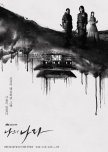Like a Collection of Character Studies
I have an odd relationship with MC:TNA because it lives in my mind rent free but my experience watching it was really messy (on my part). I actually finished the show earlier this year, in February, and it was 100% an impulsive watch and I have never seen any of the actors' previous works so I not only went into the drama blind, I was completely unarmed. The first time I watched it, the politics-heavy plot-line went completely over my head and I was at a point in my life where I would shrug at every mild to severe inconvenience that came my way and moved on, so I barely digested the actual story at all. I was initially pulled in by the plot summary promising me a focus on a platonic relationship between the main characters so I zeroed in on the friendship, and that was it.
I recently went back to watch it again in September and since I was in a different headspace—plus I did a bit of reading to gain more contextual understanding—I was able to absorb the story a /lot/ better. Still, MC:TNA always struck me as a collection of character studies between the prominent characters (Hwi, Seonho, Huijae and Bangwon) and their dynamics with each other as well as the other supporting characters, with a genuine historical event as the backdrop. I'm a sucker for these types of "small-scaled" shows (in the sense where there isn't a major, tangible overarching plot-line) so I'm easily positive about this drama—my only mistake is choosing to watch a historical Kdrama based on real historical events showcasing real historical figures with explicit mentions to other real historical figures, who don't actually show up on-screen at all, when I know absolutely zero (0) things about Korean history. That one's on me.
Nonetheless, MC:TNA holds a special place in my heart (I keep struggling to rate it 8.5 or 9.0, and every now and again I go back and edit the rating—one feels too low for my attachment, the other feels too high for its objective quality; I wish I could put it as an 8.75 but I guess that's not much of a difference in the grand scheme of things,,) and I have a very personal attachment towards it—that's me saying I don't come from a very objective standpoint when I talk about this show. I liked the character-driven narration, I liked the focus on the different perspectives and nuances in friendship and family dynamics, I liked the differences between the characters' ideologies and how that generated conflict between them, I liked the introspection and the portrayal of the different sides of being human, I liked the mix of "complex" and "simple" characters rooted in how prominent their ambitions were and how that tied to their core as individuals, I liked the emotive placement of some of the foreshadowing and dialogue (that I can specifically pinpoint and quote my favourite parts), I liked the symbolism, the cinematography, the thematic parallels, and I liked the circular ending—to me, it was adequate (ironic, touching) closure. I'm conscious of the criticism the show receives, the most popular being the hilarious (but consistent enough) plot armour, but I think the show also achieved what it came out to do quite neatly, which I appreciate. Nothing is without flaws; I think I can say I liked MC:TNA's imperfections too (within reason).
It might be because I usually gravitate towards more melancholic things but I also really liked the poignant storytelling of MC:TNA that centred around loss, guilt, grief, remorse, and loyalty. I think everyone in the show nailed their emotional scenes. I know it's already been said a million times now but I genuinely appreciate Woo Dohwan's grasp on his characters' emotions and then his expression of them (in Episode 10 and 13, iirc, there is a scene where his use of micro-expressions was especially commendable, among his other scenes). His portrayal of Nam Seonho made me sympathise for him from the get-go and while I understand that some of his motives can seem contradictory/nonsensical at times, I also believe that his variabilities aligned with how his character is someone who often does things against their own self and lies like it's a competitive sport. Though I naturally sympathise for characters like Seonho, WDH made my empathy completely unapologetic despite the often douchebaggery stunts Seonho pulls (he was doing his best!). But that's another thing I liked about MC: how polarising it can be; there are so many ways you can interpret and critique the characters, based on your perspectives.
I think MC:TNA is quite a niche(ish) show, so I believe it can be a bit of a hit or miss for people. It's not a romance and was never built up to be so, so the romantic plot-line between Hwi and Huijae is understandably on the backseat compared to the friendship between Hwi and Seonho. The political intrigue is also heavy, and the story is driven more so by the characters than the plot, so it really is up to preferences. However, if you like, or are feeling up for, political and dramatic plot elements, very flawed characters and top-notch fighting scenes (+ gorgeous scenery shots), then do give MC:TNA a try. (It is also, in my humble opinion, WDH’s best work and his best role; the months in between first watch and rewatch is an unapologetic exploration of his filmography). It's not quite a “digestible” drama per se but I’d like to call it a "thinking" drama, and those are always nice.
I recently went back to watch it again in September and since I was in a different headspace—plus I did a bit of reading to gain more contextual understanding—I was able to absorb the story a /lot/ better. Still, MC:TNA always struck me as a collection of character studies between the prominent characters (Hwi, Seonho, Huijae and Bangwon) and their dynamics with each other as well as the other supporting characters, with a genuine historical event as the backdrop. I'm a sucker for these types of "small-scaled" shows (in the sense where there isn't a major, tangible overarching plot-line) so I'm easily positive about this drama—my only mistake is choosing to watch a historical Kdrama based on real historical events showcasing real historical figures with explicit mentions to other real historical figures, who don't actually show up on-screen at all, when I know absolutely zero (0) things about Korean history. That one's on me.
Nonetheless, MC:TNA holds a special place in my heart (I keep struggling to rate it 8.5 or 9.0, and every now and again I go back and edit the rating—one feels too low for my attachment, the other feels too high for its objective quality; I wish I could put it as an 8.75 but I guess that's not much of a difference in the grand scheme of things,,) and I have a very personal attachment towards it—that's me saying I don't come from a very objective standpoint when I talk about this show. I liked the character-driven narration, I liked the focus on the different perspectives and nuances in friendship and family dynamics, I liked the differences between the characters' ideologies and how that generated conflict between them, I liked the introspection and the portrayal of the different sides of being human, I liked the mix of "complex" and "simple" characters rooted in how prominent their ambitions were and how that tied to their core as individuals, I liked the emotive placement of some of the foreshadowing and dialogue (that I can specifically pinpoint and quote my favourite parts), I liked the symbolism, the cinematography, the thematic parallels, and I liked the circular ending—to me, it was adequate (ironic, touching) closure. I'm conscious of the criticism the show receives, the most popular being the hilarious (but consistent enough) plot armour, but I think the show also achieved what it came out to do quite neatly, which I appreciate. Nothing is without flaws; I think I can say I liked MC:TNA's imperfections too (within reason).
It might be because I usually gravitate towards more melancholic things but I also really liked the poignant storytelling of MC:TNA that centred around loss, guilt, grief, remorse, and loyalty. I think everyone in the show nailed their emotional scenes. I know it's already been said a million times now but I genuinely appreciate Woo Dohwan's grasp on his characters' emotions and then his expression of them (in Episode 10 and 13, iirc, there is a scene where his use of micro-expressions was especially commendable, among his other scenes). His portrayal of Nam Seonho made me sympathise for him from the get-go and while I understand that some of his motives can seem contradictory/nonsensical at times, I also believe that his variabilities aligned with how his character is someone who often does things against their own self and lies like it's a competitive sport. Though I naturally sympathise for characters like Seonho, WDH made my empathy completely unapologetic despite the often douchebaggery stunts Seonho pulls (he was doing his best!). But that's another thing I liked about MC: how polarising it can be; there are so many ways you can interpret and critique the characters, based on your perspectives.
I think MC:TNA is quite a niche(ish) show, so I believe it can be a bit of a hit or miss for people. It's not a romance and was never built up to be so, so the romantic plot-line between Hwi and Huijae is understandably on the backseat compared to the friendship between Hwi and Seonho. The political intrigue is also heavy, and the story is driven more so by the characters than the plot, so it really is up to preferences. However, if you like, or are feeling up for, political and dramatic plot elements, very flawed characters and top-notch fighting scenes (+ gorgeous scenery shots), then do give MC:TNA a try. (It is also, in my humble opinion, WDH’s best work and his best role; the months in between first watch and rewatch is an unapologetic exploration of his filmography). It's not quite a “digestible” drama per se but I’d like to call it a "thinking" drama, and those are always nice.
Cet avis était-il utile?






